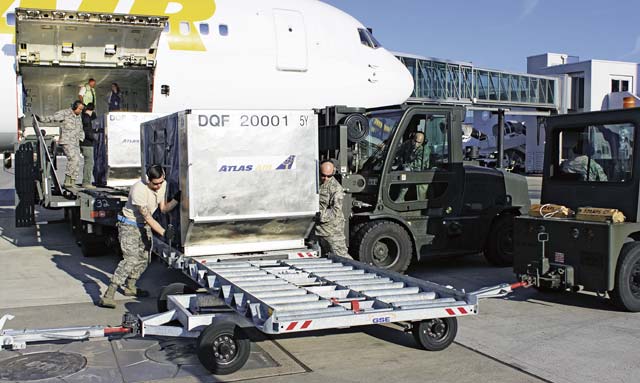
Unused forklift tines, a sheet of diamond-plated metal and one yard of steel hose. The list of spare parts technician Thomas Geibel read did not seem like much to modify a standard lift-deck, but it would save Ramstein’s 721st Aerial Port Squadron in several ways.
This modified deck, dubbed the “Donnelly Loader,” was an idea hatched by Senior Master Sgt. Wayne Donnelly, 721st APS superintendent, as a means of replacing the method of loading and unloading baggage from airframes manually. The system involves moving bins full of cargo down a series of loaders and dollies. As soon as Donnelly obtained the idea he went straight to Geibel to build the machine.
“It’s just one of those moments of inspiration when you think there has to be a better way to do this,” Donnelly said. “I always try to get the guys to think of a better way to do things. There’s nothing wrong with trying to think outside the box.”
Manually unloading baggage takes a team of 12, who often work in cramped spaces within the loading area moving bags one by one. With the new loading system, a team of six can successfully unload and load all bins of baggage, about 80 bags a bin, in less than half the time.
Staff Sgt. Anthony Como, 721st APS passenger service supervisor, said the team endured high temperatures and back pain when loading bags manually. Como was the first to train and learn to operate the forklift and modified deck.
“There’s a lot of moving pieces,” Como said. “Once you start doing it multiple times a week, it’s just second nature.”
Although the new system seemed intimidating to some Airmen, Como said it took confidence in himself and the plans the team crafted to learn the operation.
With less bodies and work time spent on the flightline, the new system exceeded expectations and is expected to save the 721st APS 30 to 40 thousand dollars a year. The fact that the deck was made entirely in-house means that the assembly was nearly cost-free.
Master Sgt. David Hawksley, NCO in charge of passenger service operations, planned the training program for the loader and managed the project’s implementation.
“I’m honored to be a part of the whole process,” Hawksley said. “Some of our folks got so excited about the process that they volunteered their free time to come in and get the mission done.”
Hawksley said he was blown away by the amount of support and enthusiasm brought by his Airmen.
“Our folks do a great job day in and day out, but you get an elevated level of performance from them when they get excited about something,” he said.
“Find a way or make one” is the motto of the 721st APS. With a simple streak of ingenuity, the current team proved that the spirit of the message still lives strong from the offices to the flightline.


